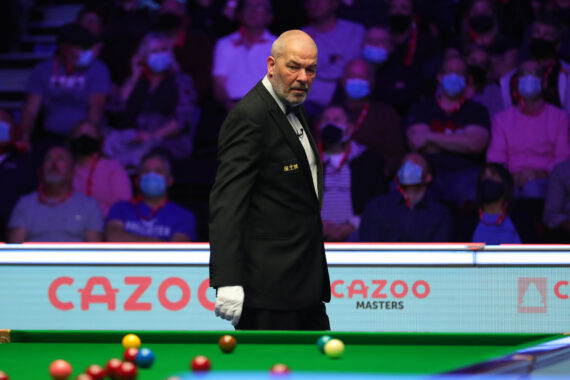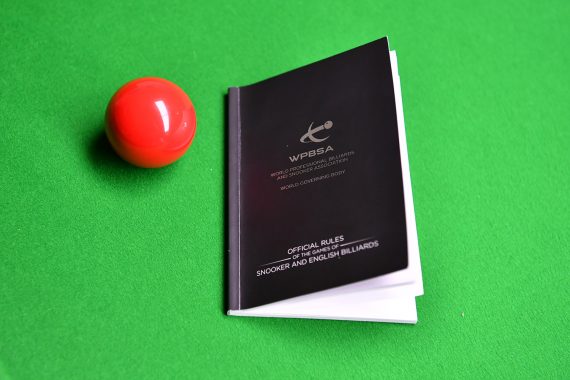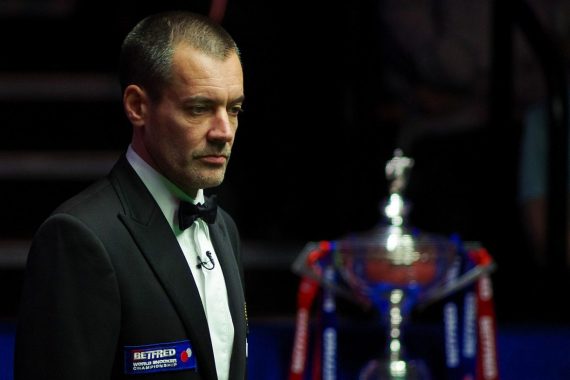Ask the Ref – Olivier Marteel
Earlier this year we invited readers to submit their questions for our leading referees, whether relating to the rules of the game, or any other aspect of refereeing at the highest level.
First up in the hot seat is Belgium’s Olivier Marteel, who earlier this month joined an elite group of referees to have taken charge of finals at all three ‘triple crown’ events, having already officiated the World Championship final (2015) and Masters final (2016).
Hailing from the village of Gijverinkhove, near Veurne, the 47-year-old began refereeing back in 1994 at amateur level, before being selected for the main tour for the first time in 2005. From there he has never looked back and continues to juggle his love for snooker with his full-time career as an A1 qualified nurse, utilising virtually all his annual leave to be able to don the white gloves on tour.
He would not have it any other way however and despite having stopped playing himself around five years ago, continues to love the game as much as ever:
“I need snooker,” said Marteel. “It is like a drug and the opportunity to referee at the highest level, with the best players of the world. To be able to see things, such as shots and situations which you try to resolve in your head, before watching the players then play the shot you couldn’t play!”
Ask Olivier
Our first question for Olivier comes from former professional David Roe following an incident that he saw in a match recently:
“One player had potted a red and the cue ball was near black spot, bridging near the black. He couldn’t clip off the black and send the cue ball back into baulk, so he nominated the yellow. He missed the first two attempts, but on the third attempt he struck the cue ball and just afterwards, his cue slipped off bridge and hit the black. The cue ball struck the nominated yellow just after, but nobody knew what the correct rule was in this situation.”
OM: “This section is covered in the official rules under section 3, 11 (b):
 “Therefore, in this situation, the correct decision would be to declare a foul and award the opponent seven points for the cue touching the black ball. However, as a stroke has been played and as the cue-ball’s first contact with a ball was with the nominated yellow, no miss would be called.”
“Therefore, in this situation, the correct decision would be to declare a foul and award the opponent seven points for the cue touching the black ball. However, as a stroke has been played and as the cue-ball’s first contact with a ball was with the nominated yellow, no miss would be called.”
Our second question is one that rarely comes up during a professional match, but is often among the first to be asked by fans on social media and in person. What must a player do when facing an ‘impossible’ snooker?
This can arise for example when a red has been potted and the cue ball has become stuck in the middle of a cluster of reds, with no way on to make contact with a colour.
OM: “Again, this particular scenario is covered by the official rulebook at section 3, 14 (a)(iii). This section states that:
 The key part of the wording is that the player must attempt to hit the ball on with ‘sufficient strength’, either directly or indirectly. As a referee, we know that in this situation the player must make a foul, there is no other way. But if the player were to for example nominate a ball at the opposite end of the table e.g. the yellow, and then just tap the cue ball into a red, we will still call a miss. The player must play the shot at a pace strong enough to hit the ball that he nominates.
The key part of the wording is that the player must attempt to hit the ball on with ‘sufficient strength’, either directly or indirectly. As a referee, we know that in this situation the player must make a foul, there is no other way. But if the player were to for example nominate a ball at the opposite end of the table e.g. the yellow, and then just tap the cue ball into a red, we will still call a miss. The player must play the shot at a pace strong enough to hit the ball that he nominates.
Our third question is from Andrew Roberts, who asks:
@WPBSAofficial (1/2) When its a pink ball game- opponent pots it to go 9 points clear. Then plays the black but fouls. #asktheref
— Andrew Roberts (@CGPphile) 8 September 2016
OM: In this situation seven points would be awarded for a foul on the black, however the frame would end and the player previously ahead by nine points ahead would still win the frame by two points.
The procedure for the end of a frame is set out in the rules under Section 2 rule 1 and Section 3 rule 4:

 Our final question is one concerning the appropriate penalty if a player is awarded a free ball, but having nominated a ball goes on to commit a foul. Is the penalty always four points, or does it differ depending upon the colour in question?
Our final question is one concerning the appropriate penalty if a player is awarded a free ball, but having nominated a ball goes on to commit a foul. Is the penalty always four points, or does it differ depending upon the colour in question?
OM: “The appropriate penalty is dependent upon the value of the ball ‘on’ as detailed at section 10 of the rules:”
Olivier’s Advice
Thank you to Olivier for taking time out in York to answer your questions. As he prepared to officiate his first UK Championship final and complete his own personal triple crown, what advice did he have to anyone wanting to become a snooker referee?
“If you really want to become a good ref – keep refereeing! Start at amateur level and keep practising.
“I always compare refereeing to packing a suitcase for a holiday. When preparing for a holiday, three weeks before you lay the empty suitcase out and over the coming weeks pack things as and when you think of them. After 3 weeks, the suitcase is full and you are ready to go.
“With refereeing, again the ‘case’ is empty, but as and when high pressure moments or incidents happen, whether you get it right or wrong, you put it in your suitcase and if it happens again, you can look back and remember them.
“Even now my suitcase isn’t full. The minute that it is then I would take off my gloves and close the case!”
Do you have any questions for one of our leading referees? Get in touch via social media or via our contact form #AskTheRef





